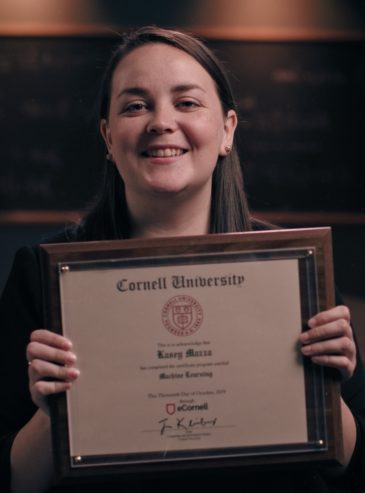STAND APART

There are numerous traits all good leaders possess, but perhaps none is more important than the ability to influence people at all levels within your organization. Through a combination of time-tested techniques and cutting-edge psychological studies, learn how to master this elusive skill.
Professor Filipowicz draws from over 1,000 studies in motivation and goal setting, as well as his global teaching and consulting experience in executive leadership, to provide a relevant and simple 5-step framework you can apply to any project and easily teach to your team. With this framework, you will have the skills needed to set challenging goals and meet them, regardless of setbacks faced in the process.
Emotions are what makes us human and they can never be fully erased from our interactions. However, as a leader, your emotions can't be your primary driver when making business decisions and managing your team.
In this course, you will improve your emotional intelligence by better identifying and managing your emotions. Professor Filipowicz will share with you two empirically supported emotion-management tools that you can use on a daily basis, ensuring that your emotional responses are more accurate, adapted and effective.
In this course, you will learn how to become more accurate in attributing causes to behavior in limited interactions, as well as how to increase your ability to get at the heart of a problem when you have the time and resources to do so. Professor Filipowicz will also teach you how to use a set of tools that can help you understand other people with efficiency, accuracy, and impact.
As a leader, you are always influencing others. However, if you're not mindful of how you exert this influence, it could lead to unforeseen consequences for yourself and your team. Your ability to negatively impact someone's performance, or elevate it to new levels, is powerful and should be taken seriously.
In this course, Professor Allan Filipowicz discusses how your beliefs drive your subordinates' performance. You'll learn how to identify negative and positive expectancy cycles and get the tools needed to reverse the former and accelerate the latter.
Being able to influence others is the most fundamental characteristic of an effective leader, but many people in positions of power don't know specifically how they are influencing others' behavior in positive directions. They let it happen by chance or use their formal authority—getting people to do things because “the boss said so.” But as leaders gets promoted within their organization, using formal authority becomes less effective as they not only need to influence subordinates, but also peers, external stakeholders, and superiors.
In this course, Professor Filipowicz explores the three complementary levels of influence. First, you will explore heuristics, or rules of thumb, that people use in order to make decisions. Next, you will learn how to influence through reciprocity by uncovering what the person you want to influence wants and needs. Lastly, you will learn how to alter the social and physical environment in order to get the change in behavior you want. By the end of this course, you'll have the skills to consistently draw out the desired behaviors from your team and from those around you.
The traditional view of team management focuses on improving interactions within a set structure in order to improve the team's performance. In this course, Professor Filipowicz offers a different perspective, one founded on the premise that how you structure the team from the start is what simultaneously drives the team's interactions and also its performance.
This course is about teams, and thus course completion will require participation in two team-based activities in order to solidify your understanding of how to best run a team. The first activity will require you to gather a team of friends or colleagues to participate in a 30-minute exercise. The second team-based activity will require you to collaborate virtually in a challenge with your fellow classmates. You will be pre-assigned to a team of approximately 5 people upon enrollment in the course, and successful course completion will depend on your active and timely participation in the challenge.
Once you have a solid understanding of the fundamental challenges that every team faces, you'll learn a set of simple, comprehensive checklists that will allow you to both design and run any team for maximum performance.
Symposium sessions feature three days of live, highly interactive virtual Zoom sessions that will explore today’s most pressing topics. The Leadership Symposium offers you a unique opportunity to engage in real-time conversations with peers and experts from the Cornell community and beyond. Using the context of your own experiences, you will take part in reflections and small-group discussions to build on the skills and knowledge you have gained from your courses.
Join us for the next Symposium in which we’ll discuss the ways that leaders across industries have continued engaging their teams over the past two years while pivoting in strategic ways. You will support your coursework by applying your knowledge and experiences to relevant topics for leaders. Throughout this Symposium, you will examine different areas of leadership, including innovation, strategy, and engagement. By participating in relevant and engaging discussions, you will discover a variety of perspectives and build connections with your fellow participants from various industries.
Upcoming Symposium: October 15-17, 2024 from 11am – 1pm ET
All sessions are held on Zoom.
Future dates are subject to change. You may participate in as many sessions as you wish. Attending Symposium sessions is not required to successfully complete any certificate program. Once enrolled in your courses, you will receive information about upcoming events. Accessibility accommodations will be available upon request.

eCornell was truly one of the best investments I made in my entire career and it’s what brought me to where I am now.
eCornell was truly one of the best investments I made in my entire career and it’s what brought me to where I am now.

What I wanted was something that had an exceptional caliber of professionals and professors, and eCornell actually gave me that.
What I wanted was something that had an exceptional caliber of professionals and professors, and eCornell actually gave me that.
- View slide #1
- View slide #2
- View slide #3
- View slide #4
- View slide #5
top Minds
100% Online
that fit your life and career.
career



